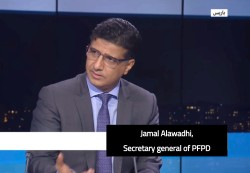Brexit: Ministers plead with MPs to back Theresa May's deal
- 2019-01-13 19:21:36


 Pierre Rayer: Art, Science, and Happiness: The Universal Mission of Transmission to Future Generations through Patronage at the Louvre Abu Dhabi
Pierre Rayer: Art, Science, and Happiness: The Universal Mission of Transmission to Future Generations through Patronage at the Louvre Abu Dhabi Ahly crowned Super champions after dramatic extra-time win over Modern Future FC
Ahly crowned Super champions after dramatic extra-time win over Modern Future FC Yemeni Honey..A Development Wealth Threatened By Conflict And Climate Change
Yemeni Honey..A Development Wealth Threatened By Conflict And Climate Change California wildfires: Millions warned of possible power cut
California wildfires: Millions warned of possible power cut Central African rebels launch attacks near capital
Central African rebels launch attacks near capital UN Says 2,000 ISIS-K Fighters Active in Afghanistan, Using Children for Suicide Training
UN Says 2,000 ISIS-K Fighters Active in Afghanistan, Using Children for Suicide Training US Hits More Than 70 ISIS Targets in Syria with Large Retaliatory Strikes
US Hits More Than 70 ISIS Targets in Syria with Large Retaliatory Strikes Maersk Ship Completes Red Sea, Bab al-Mandab Passage for First Time in Nearly Two Years
Maersk Ship Completes Red Sea, Bab al-Mandab Passage for First Time in Nearly Two Years UN Says Houthis Arbitrarily Detain 10 Yemeni Staff in Sana’a
UN Says Houthis Arbitrarily Detain 10 Yemeni Staff in Sana’a Yemen’s Overlooked Crisis Goes Beyond the Houthis
Yemen’s Overlooked Crisis Goes Beyond the Houthis
